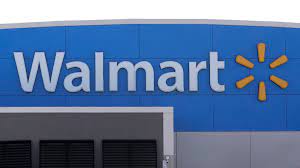
A top Walmart official stated on Friday that the company still aims to quadruple the amount of gross product volume it sells in international markets to $200 billion in five years, despite the continued uncertainty surrounding the global economy.
Gross merchandise volume (GMV) is a metric used to determine the total value of all goods sold through a platform or marketplace, in this case, Walmart's Flipkart marketplace in India and its Cashi digital payments app platform in Mexico.
"It is a pretty ambitious target. The markets that we have today have plans to be able to get there," Judith McKenna, Walmart International's CEO, told analysts at a meeting in Fayetteville, Arkansas, near the Bentonville headquarters of the world's largest retailer by sales.
Walmart's annual shareholders meeting and the analysts meeting took place on Friday in Bentonville, along with a press conference by CEO Doug McMillon.
Walmart International produced approximately $120 billion in GMV five years ago. However, after selling up its operations in Brazil, Argentina, Japan, and the UK, the figure dropped to $100 billion in the 12 months leading up to January 31, 2023.
McKenna initially revealed the plan to double Walmart's international GMV in April. Even though the International Monetary Fund cut its estimates for global economic growth in 2023 and 2024 due to ongoing inflation, she emphasised her continued confidence on Friday.
Over the past few years, Walmart's business model has changed, placing more of an emphasis on omni-channel, a strategy that connects its e-commerce, delivery, advertising, and marketplace businesses. According to McKenna, Walmart's enormous size and technological diversity will enable it to grow this strategy more swiftly.
According to McKenna, Walmart's growth will come from executing the omni-channel approach globally, expanding the 19 foreign markets where it already works, and creating a supportive business "ecosystem" similar to the one it has in Mexico.
Walmart sells common goods through physical stores in Mexico, as well as financial services via its Cashi app, telecom services via BAIT, and has recently began providing healthcare services there.
As more Americans look for deals in grocery due to recession fears, Walmart's omni-channel initiatives have been beneficial for the business. According to the business, dry grocery inflation is still a problem. Walmart and other retailers are reevaluating how they price garments, home goods, and other discretionary products or are turning to more discounts as more families are spending more of their money on food.
For the next back-to-school season, the company would provide discounted prices to entice clients to open their wallets, McMillon told reporters. According to McMillon, Walmart will concentrate on offering notebooks, pens, and pencils at low rates while providing a lot more variety and options so that customers can make purchases that fit their budgets.
(Source:www.flipboard.com)
Gross merchandise volume (GMV) is a metric used to determine the total value of all goods sold through a platform or marketplace, in this case, Walmart's Flipkart marketplace in India and its Cashi digital payments app platform in Mexico.
"It is a pretty ambitious target. The markets that we have today have plans to be able to get there," Judith McKenna, Walmart International's CEO, told analysts at a meeting in Fayetteville, Arkansas, near the Bentonville headquarters of the world's largest retailer by sales.
Walmart's annual shareholders meeting and the analysts meeting took place on Friday in Bentonville, along with a press conference by CEO Doug McMillon.
Walmart International produced approximately $120 billion in GMV five years ago. However, after selling up its operations in Brazil, Argentina, Japan, and the UK, the figure dropped to $100 billion in the 12 months leading up to January 31, 2023.
McKenna initially revealed the plan to double Walmart's international GMV in April. Even though the International Monetary Fund cut its estimates for global economic growth in 2023 and 2024 due to ongoing inflation, she emphasised her continued confidence on Friday.
Over the past few years, Walmart's business model has changed, placing more of an emphasis on omni-channel, a strategy that connects its e-commerce, delivery, advertising, and marketplace businesses. According to McKenna, Walmart's enormous size and technological diversity will enable it to grow this strategy more swiftly.
According to McKenna, Walmart's growth will come from executing the omni-channel approach globally, expanding the 19 foreign markets where it already works, and creating a supportive business "ecosystem" similar to the one it has in Mexico.
Walmart sells common goods through physical stores in Mexico, as well as financial services via its Cashi app, telecom services via BAIT, and has recently began providing healthcare services there.
As more Americans look for deals in grocery due to recession fears, Walmart's omni-channel initiatives have been beneficial for the business. According to the business, dry grocery inflation is still a problem. Walmart and other retailers are reevaluating how they price garments, home goods, and other discretionary products or are turning to more discounts as more families are spending more of their money on food.
For the next back-to-school season, the company would provide discounted prices to entice clients to open their wallets, McMillon told reporters. According to McMillon, Walmart will concentrate on offering notebooks, pens, and pencils at low rates while providing a lot more variety and options so that customers can make purchases that fit their budgets.
(Source:www.flipboard.com)














